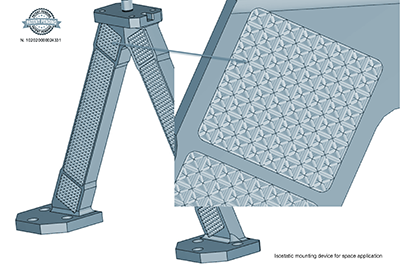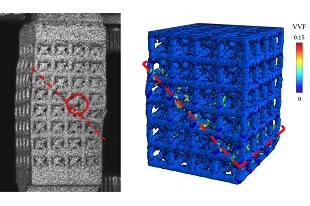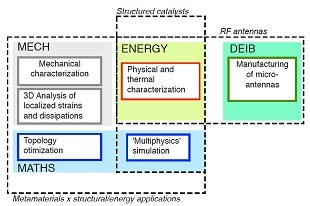
The inter-departmental MetaMAT-Lab was born in 2017 thanks to the collaboration among the Department of Mechanical Engineering, the Department of Energy, the Department of Electronics, Information and Bioengineering, and the Department of Design to share specific knowledge on metamaterials.
By combining their chemical composition and geometry, metamaterials allow the extension of the range of the physical properties of ordinary materials and the creation of materials with electromagnetic, acoustic, thermal, and mechanical properties that do not exist in nature. Therefore, they happen to be perfect for such applications where conventional materials represent an active constraint when designing a new component.
At the heart of the MetaMAT-Lab lays the cross-cutting convergence of multidisciplinary skills to study and understand the physical and mechanical behaviour of metamaterials, search for new possible applications and conceptual designs of components. Within this context, the Department of Mechanical Engineering plays an active role in characterising the mechanical behaviour of metamaterials through experimental and numerical activities, focusing on fatigue, fracture and (mono and multi-axial) static resistance. Along with these activities, researchers also carry out conformity analysis of geometry through CT (computed tomography) and optical analysis. The Lab is involved in both academic and industrial research activities. We recently collaborated with different industrial partners to create aeronautical and aerospace components with specific mechanical, thermal and permeability properties. Here some examples: heat exchangers, deoilers, heat pipes, and isostatic mounting device for thermal insulation (patent for industrial invention application n°102020000024331).
Available lab equipment:
- Deben micro-samples testing machine (capacity 5kN);
- Instron E10000 testing machine (capacity 10kN) for static and fatigue tests with environmental chamber (temperature - 100 °C/+ 350 °C);
- Optical microscopes to carry out Digital Image Correlation (DIC) analysis to monitor the strain of samples during tests;
- DIC Aramis GOM system to dynamic measure of coordinates, displacements, and 3D superficial strain;
- Thermal conduction detection system on small samples from 0.0005 m2K/W to 0.05 m2K/W tested with the Heat Flow Meter technique;
- Micro-milling to machine RF and PCB aerial prototypes;
- Workstations.
Offered services:
- Sample creation through diverse techniques (additive manufacturing for metals, polymers, and micro-founded materials);
- Measurement of static mechanical properties through tension and compression;
- Measurement of fatigue and damage strength;
- Measurement of the microgeometry of the samples via tomography and reconstruction of the solid model;
- Measurement of the electromagnetic properties of the sample;
- Multiphysics simulations on reconstructed geometry;
- Topologic optimization of the micro-geometry to reach the thermal and mechanical target properties.
Involved Faculty Members:
Prof. Stefano Beretta, Prof. Stefano Foletti, Marco Pisati, Matteo Gavazzoni, Laura Boniotti




